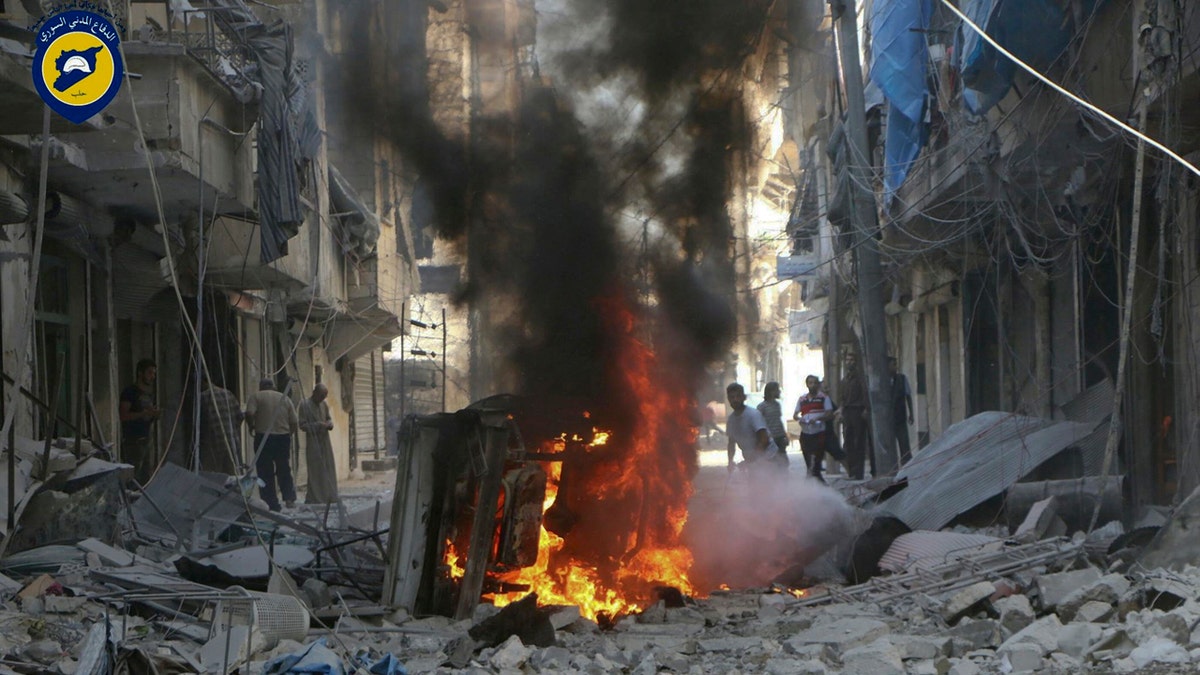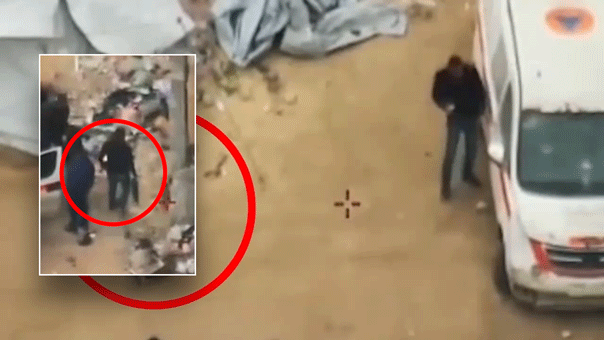
Syrians inspect damage after a government airstrike in Aleppo (Syrian Civil Defense White Helmets via AP)
BEIRUT – With international diplomacy in tatters and the U.S. focused on its election, the Syrian government and its Russian allies are seizing the moment to wage an all-out campaign to recapture Aleppo, unleashing the most destructive bombing of the past five years and pushing into the center of the Old City.
Desperate residents describe horrific scenes in Syria's largest city and onetime commercial center, with hospitals and underground shelters hit by indiscriminate airstrikes that the U.N. said may amount to a war crime.
Debris covers streets lined with bombed-out buildings, trapping people in their neighborhoods and hindering rescue workers. On Tuesday, activists reported at least 11 people killed in airstrikes on two districts in the rebel-held part of Aleppo.
The battle for Aleppo is unlikely to be an easy one for government forces because the isolated rebels say they are determined to "fight until the end" to defend their neighborhoods. Insurgents outside the city could also attack government troops to try to reduce pressure on comrades trapped inside.
If government forces and their allies capture the rebel-held eastern neighborhoods, it would be a turning point in the 5 1/2-year-old civil war that has killed more than 250,000 people and displaced half of Syria's population.
Over the course of the conflict, the government has slowly regained control of major cities. Its aim appears to be securing what some analysts call "useful Syria" -- a portion containing the four largest cities of Aleppo, Damascus, Homs and Hama, along with its Mediterranean coast.
Aleppo is the last of the major cities still being contested, and it could take government forces between six months and a year to capture it, unless they aim to "annihilate" the politically significant city, a Western diplomat told The Associated Press. The envoy, who is familiar with the cease-fire talks that have faltered, spoke on condition of anonymity because of his government's regulations.
Once all of "useful Syria" is in government hands, international diplomacy would have to determine the fate of the jihadi-controlled northwest and those areas dominated by the main Kurdish militia and the Islamic State militant group.
President Bashar Assad "doesn't want a negotiation," the diplomat said, adding that "the Russians wouldn't or couldn't stop him" from attacking Aleppo.
In Russia, Deputy Foreign Minister Mikhail Bogdanov told Syria's ambassador that Moscow has "a firm intention to continue providing assistance to the Syrian government in fighting terrorism and to help achieve the soonest possible political settlement of the Syrian crisis."
Opposition forces control almost half of Aleppo, the only major city where rebels hold such a large area. The U.N. says more than 250,000 people live in the rebel-held areas, while more than 1 million are in the government-controlled part that is usually subjected to shelling.
Assad's government controls the capital of Damascus, except for two small neighborhoods. It also controls all of Homs and Hama, the third- and fourth-largest cities.
Since the one-week cease-fire brokered by Russia and the U.S. ended Sept. 19, Aleppo has been under intense Russian and Syrian airstrikes, killing more than 200 civilians, knocking down entire buildings, disrupting water supplies and targeting Civil Defense centers. At least one of the eight remaining clinics in the city was put out of service.
Had the cease-fire held, the U.S. and Russia were supposed to announce the establishment of a Joint Implementation Center to coordinate attacks against the Islamic State group and al-Qaida's affiliate in Syria, formerly known as the Nusra Front.
Attempts to revive the cease-fire during the U.N. General Assembly failed, and U.S. Ambassador Samantha Powers harshly criticized Russia, saying Moscow was practicing "barbarism."
Hilal Khashan, political science professor at the American University of Beirut, said the decision to escalate the fighting occurred because Russia believes the U.S. has not been forthcoming in cooperating on coordinated attacks against the Nusra Front.
Last week, the Syrian army ordered civilians to stay away from rebel positions, saying a ground offensive would begin. On Tuesday, government forces captured the rebel-held central neighborhood of Farafra near the Old City.
Residents are stunned by the intensity of the bombing on areas that have seen a sharp increase in food prices due to the siege, which tightened earlier this month.
Ibrahim Alhaj, a member of the Syrian Civil Defense, said his parents' house was shelled, and he was able to save them only because he lives nearby.
Assad "listens to no one -- not the United Nations, not anyone," a desperate and exhausted Alhaj said. "Is there no humanity in this world?"
Clinics have been flooded with casualties in the past week. Many had to be treated on white-tiled floors covered with blood.
Online amateur video showed people running to the site of the airstrikes, screaming the names of their relatives as they searched for them.
Several thousand rebels from different factions are believed holed up in eastern Aleppo, with the largest being the Nour el-Din el-Zinki group.
"The regime and its allies know very well the high price they will pay if they try to storm liberated Aleppo," said Yasser Alyousef, a spokesman for the group, referring to the rebel-held sector. "The rebels have become experts in street warfare and ways to drain the enemy."
Residents, fearing further targeting, deny the presence of any Al Qaeda-affiliated fighters inside the besieged area.
Brita Hassan Haj, head of the Aleppo council in the area, said the government's aim was to drive residents out. On Monday, 25 of eastern Aleppo's 63 neighborhoods were bombed, he said.
"Bunker-buster bombs are penetrating underground shelters, leaving no one safe," he said. "The main roads are closed, the civil defense can't operate, and people are dying. ... It is like judgment day."
The leader of Lebanon's Hezbollah group, which has thousands of gunmen in Syria fighting alongside Assad's troops, was quoted by Lebanese newspapers Tuesday as saying: "There are no solutions (for Syria) on the horizon. It will be decided on the battlefield."








































